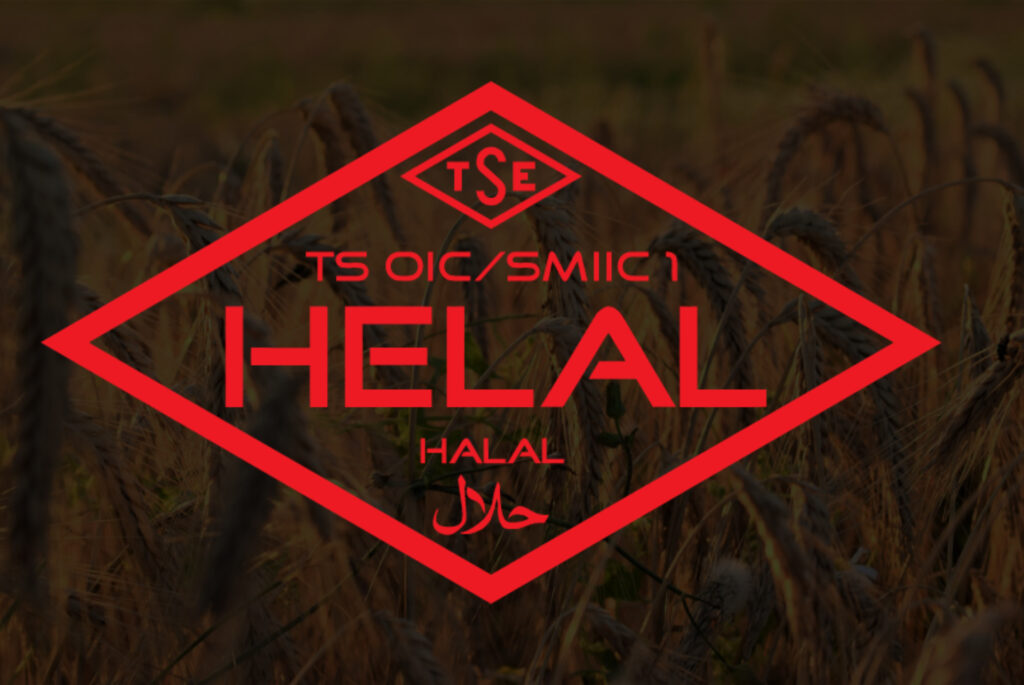Halal Certificate

It is generally a clean and trustworthy product that is halal. Furthermore, it refers to a product created using Islamic-compliant raw materials, activities, and processes at all levels, from the input of raw materials to the consumption of the completed product. In this sense, Halal refers to products not banned by the Islamic religion.
Some of the non-halal products are listed below:
- Any kind of product, activity that is explicitly prohibited According to Islamic rules
- Pig or wild bear,
- dog, snake or monkey,
- Lions, tigers, etc. with claws and front teeth. Carnivorous animals,
- Eagle, vulture ,etc. Hunter birds,
- Mouse, centipede, scorpion and similar harmful animals,
- Animals prohibited according to Islamic provisions such as bees, ants and woodpeckers,
- Animals often disgusted and unwanted among humans, such as lice, flies or other similar animals,
- Frog, crocodile and other similar animals, both land and aquatic,
- Any non-squama sea creatures,
- Any animal that is not cut off according to Islamic rules,
- blood or Ready meals mixed with blood
- Animals living in the water that not hunted according to the Islamic provisions
- Alcoholic, toxic or harmful beverages or substances which have been mixed with them.
Halal Standard is a set of guidelines designed to make it easier for people to choose healthy, dependable, and halal items. The Halal Standard is a crucial source for creating and consuming both dependable and clean products as well as Halal items that are approved in the Islamic religion. The ISO 22000 Food Safety Management System Standard is the foundation for the Halal Standard.
WHAT ARE THE BENEFİTS OF THE HALAL DOCUMENT?
The Halal certificate should not only be considered as a certificate for food products. It should also be noted that packaging, labeling, transport, service and logistics activities of the products also include features related to hotels, travel, pharmacy, cosmetics and related devices and other health products. As you can see, the Halal document, which is relevant to various sectors, has many benefits in terms of reliability both to the producer and to the consumer
Some of these are as follows:
- The Halal document creates a link of trust between the producer and the consumer.
- The day is a guide for manufacturers to develop their own systems and products in order to meet the increasingly conscious consumer demands.
- It promotes clean and reliable product applications.
- The Halal Standard plays an important role in increasing the quality of the products as they are based on the ISO 22000
- Standard, which has been proven to be valid in the international public, and will enable producers to produce better quality and safer products.
- It provides a neutral expert and expert service supervising the raw materials, products, production stages, additives and their contents and processing methods.
- It shows the structure of the sector to the producers, determines its place in the sector and provides a source to catch up with developing and changing market conditions.
- Increased “Halal Certified Product” helps producers increase competition power in demand.
- Halal documentary producers have a share in the export market for Muslim countries and take them one step forward to increase their share.
- Innovations that are constantly evolving and changing in technology, increasing needs and expert opinion support are followed without following customer expectations.
- At this stage, it is an excellent resource for halal system producers who are supervised by experts who know Islamic provisions very well in scientific light.
- Halal certified products help to avoid disputes in exports to countries that request.
- It does not only mean halal food, it also provides clean and reliable food, customer satisfaction, quality control methods, improvement of required documentation and less loss and more efficiency.
WHO CAN USE / IMPLEMENT HALAL STANDARD?
- Halal Standard can be used and implemented by all companies producing and selling abroad, especially Muslim countries.
- Since the Halal Standard is primarily based on a safe product basis, companies must also meet the requirements of the ISO 22000 Standard. Here are some of the sectors that may have halal certification:
- All kinds of food, food additive, food packaging material producing and selling companies,
- The hotels and restaurants,
- Companies that produce and sell personal care products, personal hygiene products, cosmetic products,
- Companies that produce and sell domestic and industrial cleaning chemicals and cleaning materials,
- Companies that produce and sell chemicals, drugs, materials and devices used for health purposes,
- Logistics services, garbage collection, waste collection, etc. Service companies engaged in business,
- Companies producing feed and feed additives,
- Companies that produce and sell chemical and biochemical products, including insecticides and fertilizers,
- Companies that manufacture and sell process machines and equipments,
- Firms engaged in packaging and sales of drinking water,
- Farms and fishermen.


